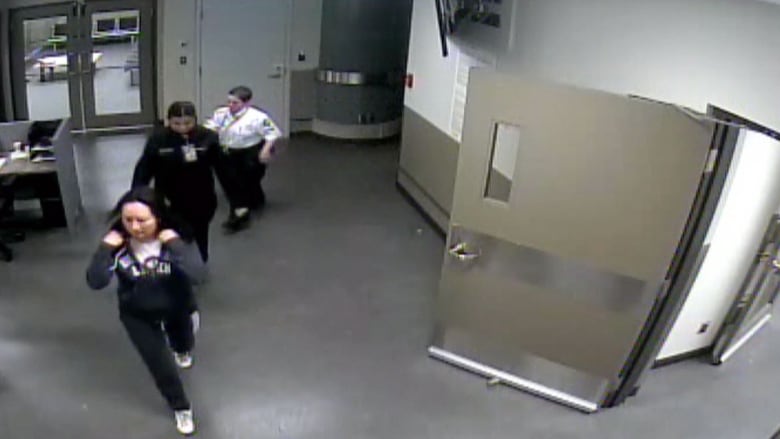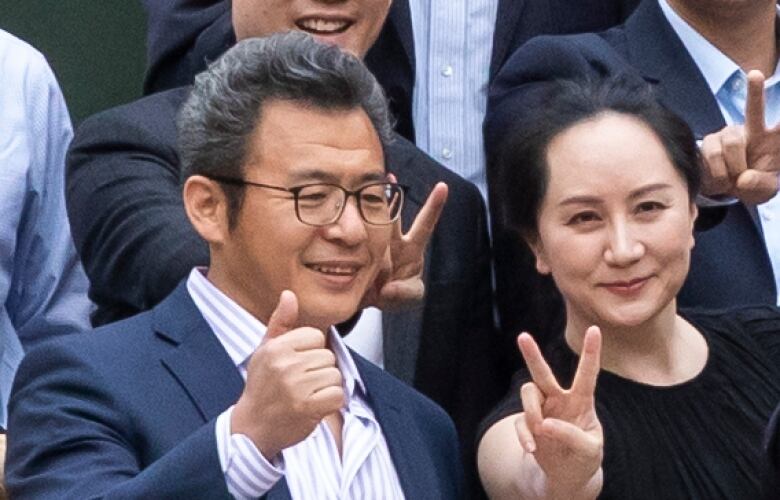Jason Proctor is a CBC reporter and the writer of the podcast Sanctioned: The Arrest of a Telecom Giant. The final chapter of the series will be released on Nov. 1.
In the past three years, I’ve spent hundreds of hours thinking about Meng Wanzhou.
I’ve stood outside her house. I’ve sat behind her in a courtroom. And on one memorable spring evening, I hid behind a tree as the Huawei executive posed on the steps of the B.C. Supreme courthouse to celebrate a victory that never happened while she thought no one was watching.
But I’ve never actually spoken to Meng.
It’s been a month since she returned to China. Now that she’s back, I’ll likely never have the chance to ask her about her take on the U.S. extradition request that upended her life, shredding relations between Canada and China in the process.
She knows who Michael Kovrig and Michael Spavor are — her lawyers raised the situation of the two Canadians imprisoned in China in apparent retaliation for Meng’s arrest in court documents arguing for her release.
But I’ll never get to ask Meng what it feels like to be on the other end of what most observers believe was hostage diplomacy. Not that I would have held my breath for a satisfactory answer anyway.
Perhaps that’s the perfect ending to the Meng Wanzhou saga, a legal conflict that was — in reality — always about a geopolitical battle.
Nothing was ever completely as it seemed, from the motivations behind Meng’s arrest to the conclusion of the charges against her, which happened in court but were almost certainly manipulated by forces far beyond the reach of any judge in New York or British Columbia.
So what was it all about?
Assessing the cost
As a reporter, the question I’ve been asked most frequently since Meng resolved fraud charges through a deferred prosecution agreement with U.S. prosecutors on Sept. 24 is just how much the extradition proceedings in this country cost.
And not just in terms of money.

Canada Border Services Agency and RCMP officers saw their reputations dragged through the mud during testimony about the events surrounding Meng’s arrest in December 2018.
One CBSA supervisor cried on the stand.
A retired RCMP staff sergeant was accused of breaking the law by sharing information with his FBI counterparts and then refusing to testify about it in court.
And that’s to say nothing of the conditions Spavor and Kovrig were subjected to in Chinese prisons, held in solitary confinement, accused and tried in secret on trumped-up charges of espionage.
By contrast, Meng’s bail conditions appeared luxurious, but she also chafed against the confines of her golden chains, pleading with a judge to loosen restrictions that had her living under curfew, tailed by security guards, a GPS ankle-monitoring bracelet strapped to her ankle.
The ‘great, titanic struggle’
For what it’s worth, Meng always maintained her innocence, even after signing a statement of facts in which she essentially agreed to the core of the U.S. case against her.
The charges stemmed from lies Meng allegedly told an HSBC executive in Hong Kong in August 2013 about Huawei’s control of a subsidiary alleged to have violated U.S. economic sanctions against Iran.

I can still recall listening to tape of Meng’s first appearance in B.C. Supreme Court, a hearing that occurred before news of her arrest was widely known. Defence lawyer David Martin struggled to convey the implications of his client’s arrest.
Meng was not just the chief financial officer of the world’s largest telecommunications company — she was the daughter of the company’s billionaire founder.
Martin spoke of the “great, titanic struggle” between China and the United States. He compared Meng to Facebook Chief Operating Officer Sheryl Sandberg.
He also predicted an “orgy” of speculation once news of the extradition request broke.
The ‘rule of law’
Martin was right: there was an explosion of interest, and then-U.S. president Donald Trump said he would be willing to use Meng as a bargaining chip if it might help secure a better trade deal with China.
Prosecutors later claimed Trump’s words shouldn’t be a factor in denying the extradition, but it was hard not to see the case as political — especially as it would now appear that the influence of Trump’s successor, Joe Biden, finally brought the case to a close.

So could any of that cost — human or monetary — have been avoided?
From the start, Prime Minister Justin Trudeau claimed Canada had no choice but to follow a well-established pattern in extradition cases that would only see the minister of justice weigh in on the merits of the case after the court process played itself out. It was the “rule of law.”
Michael Kovrig’s wife, Vina Nadjibullah, sat in on the courtroom hearings.
The couple were separated at the time of his detention, but Kovrig remained a vital part of Nadjibullah’s life and she fought tirelessly for his release.
I’ve often wondered what it was like for her, sitting just feet away from the woman whose fate appeared directly tied to her husband’s. What did the “rule of law” mean to Nadjibullah — and to him?
Precedent, procedure, absurdity
The court sometimes felt like a hermetically sealed chamber, where prosecutors, defence lawyers and the judge debated minute points of precedent and procedure as though the tensions raging outside didn’t exist.
There was an absurdity to the proceedings. The alleged victim was a bank that had its own history of violating U.S. economic sanctions — HSBC was under the terms of a deferred prosecution agreement at the time the alleged offences took place.

The central piece of evidence was a PowerPoint presentation.
Even the judge seemed to struggle with the complexity of the charges. And there was no evidence anyone involved actually lost any money — besides Canadian taxpayers.
Meanwhile, Huawei mounted a full-on charm offensive.
Public relations people and senior executives descended on Vancouver. They suggested the possibility of interviews with Meng’s security guards and friends that might make great stories, but nothing transpired.
At one point, CBC even had tickets booked to Shenzhen, China, for The National host Adrienne Arsenault and me to interview Meng’s father, Ren Zhengfei. But Huawei cancelled at the last minute.
They gave us a massive, glossy book of quotations: In His Own Words: Dialogues with Ren, which provides detailed transcriptions of the CEO’s many interviews with the media.
It’s a perfect memento of my interactions with Huawei’s representatives: earnest, slightly weird and completely useless for the purposes of reporting.
Witness to a charade?
Meng Wanzhou’s arrest placed Vancouver and Canada in the middle of the battle between superpowers that promises to define our time.
I feel fortunate the CBC let me cover the case from cover to cover; we even produced a podcast.
But I can’t help but feel I was witness to a charade. Not that any of the other participants might have felt that way, or that any of us had a choice but to play our roles.
B.C. Supreme Court Associate Chief Justice Heather Holmes spent years considering arguments and evidence tendered in favour of a decision that will never be delivered.
Everything that happened in her court was rendered moot with the deal that saw Meng go home.
Did Holmes feel used? Or is that just the way the rule of law works?
While Chinese and American politicians and Canadian lawyers performed on their respective stages, could the people for whom this story was a very real tragedy, lived out behind concrete walls and iron bars, have been spared any of their agony?
A win, win, win?
Everyone claimed victory anyway.
The U.S. Department of Justice crowed that Meng had “taken responsibility for her principal role in perpetrating a scheme to defraud a global financial institution.”

A spokeswoman for China’s foreign ministry called the charges against Meng a “political frame-up and persecution of a Chinese citizen” and credited her government’s “unremitting efforts” as the reason for her return.
Trudeau thanked Canada’s diplomats. And now, Canada, the U.S. and China are all preparing to compete in the 2022 Winter Olympics in Beijing.
Meng stepped off a plane and back into her old life as a hero, walking a red carpet splayed across the tarmac as Ode to the Motherland played in the background.
Dancing Huawei employees greeted her upon her return to the office last week. At no point has she said anything publicly about admitting to telling any lies.
I’m still around if Meng Wanzhou ever decides she wants to talk.
She owns a piece of this puzzle. But I’m not certain we’ll ever know the truth.





More Stories
Fair share: the right office solution can take finding the right partner
Ontario faces crew shortages, aircraft issues in fight against wildfires | Globalnews.ca
Refugee attends open house at Downtown Eastside affordable housing facility – BC | Globalnews.ca